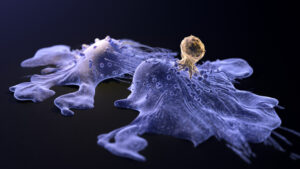Three different types of chimeric antigen receptor (CAR) T-cell therapies have been approved to treat refractory or relapsed large B-cell lymphoma. Many patients have side effects such as immune effector cell-associated neurotoxicity syndrome, hematotoxicity (also called immune effector cell-associated hemato-toxicity), neutropenia, anemia, and thrombocytopenia. Over half of patients require RBC or platelet transfusions after CAR T-cell infusions, but little is known about transfusion patterns, predictive factors, or outcomes after transfusions. To this end, researchers in France followed 671 patients requiring CAR T-cell therapy for large B-cell lymphoma (median age, 63 years; 63.9% axi-cel and 36.1% tisa-cel CAR T-cell therapy); patients were followed for at least six months with a median follow-up time of 18.2 months. In the six months before CAR T-cell therapy, 59.8% were transfused with RBCs and/or platelets (53% and 44%, respectively), with transfusions peaking the month before therapy. In the six months after therapy, 56.3% of patients required a transfusion with transfusions peaking in the first month at 53.5% and decreasing to 6% beyond the third month. Predictive factors for RBC and platelet transfusions after CAR T-cell therapy were associated with a high (>2) CAR-HEMTOTOX score and transfusions before therapy. The overall response rate for CAR T-cell therapy was 71.8%; but during the study, 51.4% of patients died. Mortality was significantly higher for patients who received RBC or platelet transfusions the first month after therapy (P<0.0001 for both). Further studies are needed on how to best support patients after CAR T-cell therapy infusions.
Reference:

